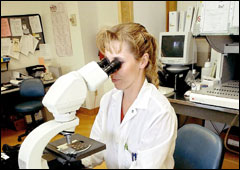Scientists at the University of Pittsburgh School of Medicine have shown that adult stem cells from muscle of young mice can improve the health and extend the life of aged mice.
 The research team tested aged mice that are a model of an aging disease called progeria; the condition leads to advanced early aging. The idea was that in aged mice, the adult stem cells may have lost their vitality, with problems in proliferation (growth) as well as differentiation into other tissue types.
The research team tested aged mice that are a model of an aging disease called progeria; the condition leads to advanced early aging. The idea was that in aged mice, the adult stem cells may have lost their vitality, with problems in proliferation (growth) as well as differentiation into other tissue types.
However, when cultured in the same lab dish as muscle adult stem cells from young mice, the stem cells from aged mice recovered their ability to grow and differentiate. When young adult stem cells were injected into the abdomens of aging mice with progeria, the mice lived two to three times longer than expected and were healthier than aging control mice. Instead of losing muscle mass and moving slowly, the animals grew as large as normal mice. The Pitt researchers found evidence that the young adult stem cells secret a growth factor that delays the aging process.
Senior investigator Dr. Johnny Huard suggested that human muscle-derived stem cells could be stored at an early age and used when people age, allowing some rejuvenation of tissues and slowing the aging process.
The study was published online in Nature Communications.







